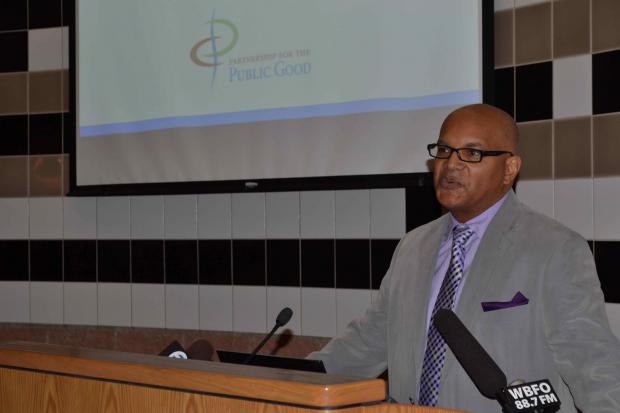Coalition Decries Local Minority Employment Figures
Buffalo may be on the rebound in many ways, but not everyone in the city has been experiencing that success story.
And so a coalition of clergy, labor organizations, and advocacy groups is embarking on a mission, with the aid of a newly released report on employment and race in the Buffalo-Niagara region commissioned by the Partnership for the Public Good, to push for policies that help African Americans and Latinos, who are unemployed in larger numbers and more likely to find jobs in low paying fields, get quality work.
At a press event at the Frank E. Merriweather Library, Rev. George Nicholas of the Lincoln Memorial United Methodist church said that the purpose of the campaign is not to impede progress but to make sure that people from all neighborhoods and socio-economic circumstances have a chance to take part in the region’s improving economic conditions.
“Those of us, as part of this working group, feel it’s very important for us to tell the whole picture about what’s happening in the region, not only from a historical standpoint, but from what’s happening right now,” Nicholas said.
The report, which examines recent employment trends in Western New York through the lens of race, found that African Americans and Latinos not only had outsized levels of unemployment and poverty in the region, but that those figures were significantly worse than statewide and national trends.
While the average unemployment rate for African Americans from the years 2010 to 2014 was 16.1 percent nationally and 14.4 percent across the state, the equivalent rates were 17.3 percent in Erie County and 19.2 percent in Buffalo.
The Partnership for the Public Good, which co-director Sam Magavern calls a “think and do tank,” has more than 200 member organizations. The group’s report analyzes data on race and employment and also identifies root causes and offers a set of recommendations that the coalition leadership has vowed to push for this year, including targeted hiring policies, anti-discrimination enforcement, higher wages, more work supports and better jobs.
Before a crowd of about 60 people, Magavern said that the numbers show what many people living in the East Side neighborhood where the press event was held on Tuesday already see in their everyday lives.
“Overall, the big picture is that for all the progress we’ve made nationally and in our community, as you all know, severe racial inequality persists in this nation and in this region, and in no area of life is it more important than in employment,” Magavern said. “For most people a good job is the key to a better life.”
The study found that not only are unemployment rates about twice that of whites for African American and Hispanic people, but that they also make far less, 71 cents and 73 cents respectively for every dollar a white worker makes.
Taking steps to address the disparities could spur an increase of $3.5 billion to the region’s gross domestic product, according to estimates from the research and advocacy group PolicyLink.
“This is not just an issue for the people who are being disadvantaged,” Magavern said. “It’s not just an issue for people of color. This is an issue for the whole region. It’s dragging us all down together.”
With the Western New York American Labor Federation on board and the support of the statewide chapter of the AFL-CIO the coalition brings in powerful friends with plenty of experience pushing for their preferred policies in Albany and beyond.
Angela Blue, the community outreach specialist in the Buffalo region for the New York State AFL-CIO, urged people in the audience to read and share the report and to join the coalition for a March summit where they will seek community input to be used in the push for action from lawmakers.
Blue invoked Martin Luther King Jr., and asked whether people in the audience felt like significant progress had been made since the civil rights movement.
She then asked the people gathered to raise their hands if they knew someone who was unemployed or had been looking for work for a long time. More than half the people put a hand in the air.
“It’s a problem,” Blue said. “It’s a problem that hits home. It’s a problem that affects us all.”
A version of this report appeared at City & State, and appears here courtesy of a content-sharing agreement.

